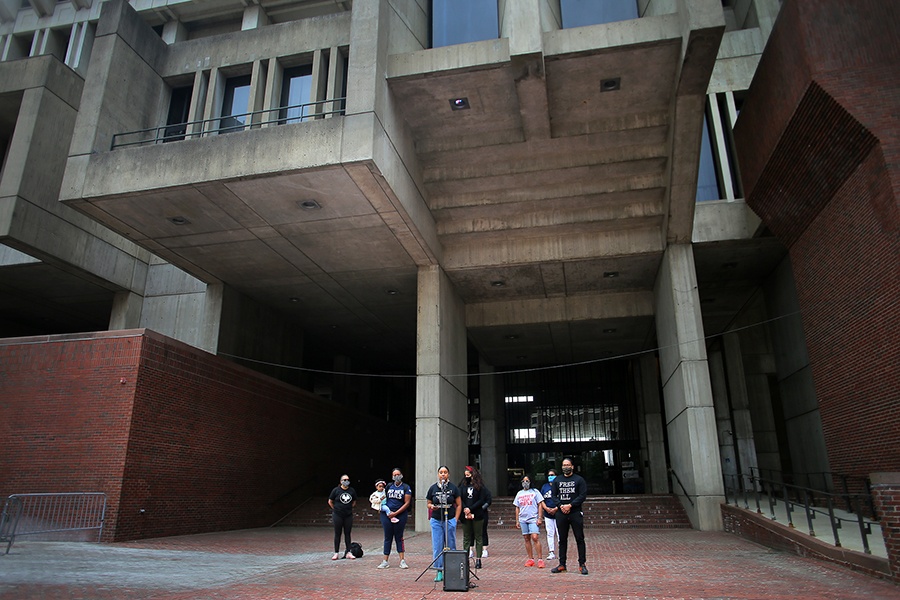How to Make Sure Your Anti-Racism Work Is a Lifelong Endeavor
A Boston University sociologist offers tips on how to sustain your activism work for the long haul—not just while the topic is hot.

Families for Justice as Healing held a press conference outside City Hall to urge officials to decrease funding to the Boston Police. Photo by Lane Turner/The Boston Globe via Getty Images
The last few weeks have seen a fever pitch of activism, protests, and fundraising across Boston and beyond in support of the Black Lives Matter movement. People have advocated for change in police funding, pushed for the abolishment of police forces, donated to bail funds, and pushed for change across a broad range of industries beyond policing. But anti-racism work is a lifelong pursuit. If and when the protests in Boston and across the nation die down and newsfeeds are no longer delivering a constant stream of anti-racism articles and news bites to your living room every day, will you still be standing up for Black lives?
Here, Julian Go, a sociologist at Boston University who researches social theory, politics, and culture, shares tips on how to sustain your activism work in the days and years to come.
As protests fade, don’t let your voice go silent
“The heat of the moment is going to fade,” Go says. “The news cycle changes and with the elections coming up, there will be other issues the public will turn their attention to.” As this happens, it’s essential to not stop talking about these issues. Consider joining or starting a Facebook group where you can discuss policies and systems with your friends and families so your own newsfeed stays active, but also keep in mind existing organizations that have been doing the work for years, and look for ways to help them. “There are a ton of on-the-ground grassroots organizations, in Boston and beyond, that need help to continue spreading the word,” Go adds. Effective communication and appropriate language have never been more important. And effective rhetoric paired with immediate action is what sustains change.
Continue to stay informed, educated, and connected to the cause
While the protests will probably eventually slow down, don’t let that be an excuse to turn your head away from the very real reality that systemic racism harms people every day in this country. Social media has proven to be a strong method to drive cultural change, as we’ve seen recently in the past two weeks through #BlackOutTuesday, the outpouring of support for Black activism, and the constant sharing of fundraisers. Go recommends turning to local activists and leaders in Boston by following what they’re doing on their social media channels or websites. A good place to start is Black Lives Matter Boston. “Police reformation has been discussed and pursued by various groups for some time, and these protests have increased interest in these groups,” Go adds. “The attention of the general public needs to stay on these matters. But you need to keep yourself educated by following the right people, not simply allowing CNN or Fox News to shape your opinion.”
Reach out to your local politicians and demand policy change
The quickest way for a movement to die is if the public doesn’t see immediate change. We’re human, and when change doesn’t happen quickly, it can be difficult to stay the course. Go says to channel your energy into doing something, like pressing your local political parties for change. If you’re wondering how to take part in activism outside of protests, this roundup is a good start.
Consistently support Black-owned businesses, donate your time and money, and pass the mic
“The point of street activism is to result in real concrete change,” Go says. While Go says this most often takes the form of policy change, and while policy change is critically needed, he emphasizes we, as individuals, hold some power with where we choose to spend our time. That includes where we spend our money and who we choose to interact with. Consider supporting Black-owned businesses when you plan on going out to eat or when you shop, or donate time and resources to these non-profit organizations helping the Black community, and remember to pass the mic if you are not Black yourself.

